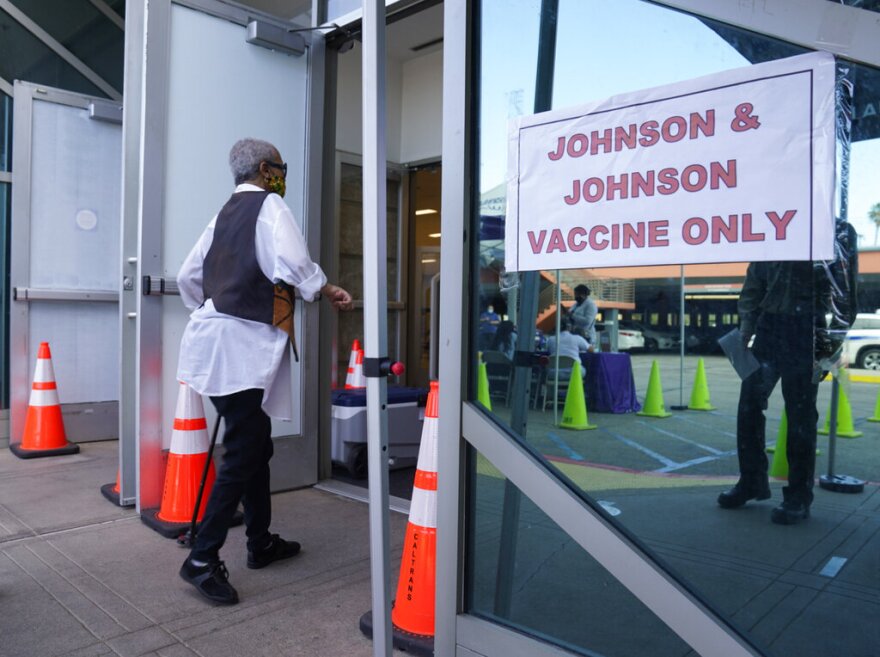Connecticut and New York have joined states across the U.S. in pausing the use of the Johnson & Johnson COVID-19 vaccine.
The CDC in a joint statement with the Food and Drug Administration suggested pausing the one-shot vaccine while they investigate six cases of rare blood clots in patients, all of them women, after receiving a dose.
Nearly 7 million people have received the one-shot vaccine without reports of serious illness.
People who got the Johnson & Johnson vaccine who develop severe headaches, stomach pain, leg pain or shortness of breath within three weeks after vaccination should contact their medical provider.
Some vaccination appointments for Johnson & Johnson today will be honored with the Pfizer or Moderna shots while supplies last. Others will be contacted by their providers to reschedule.
Dr. Lawrence Eisenstein is Nassau County Health Commissioner.
“This happens frequently when vaccines are rolled out. It’s part of the safety process, part of the protections that our federal agencies have for our residents. So, I’m not even drawing any final conclusion on Johnson & Johnson other than we are just gonna wait and see what the data shows us and follow the CDC and FDA guidance when it comes back out,” Eisenstein said.
New York and Connecticut have been relying on Johnson & Johnson to vaccinate their homebound residents, students and inmate population.
After the Food and Drug Administration and Centers for Disease Control announced the temporary halt Tuesday morning, Governor Andrew Cuomo said New York State is also pausing the doses.
“We have stopped using Johnson and Johnson in this state,” Cuomo said.
Cuomo spoke at an unrelated event at an apple orchard that was closed to the media and the public, and where he answered no questions about the vaccine delay. The governor said there are enough alternative doses available for state-run vaccination sites to continue.
“We do have enough Pfizer and we do have enough Moderna to keep our schedule,” the governor said.
New York State Health Commissioner Dr. Howard Zucker advises anyone who did receive a Johnson & Johnson dose and develops a severe headache, abdominal pain, leg pain or shortness of breath within three weeks after vaccination to contact their doctor. But Zucker said the incidence of developing blood clots after the vaccine are “extremely rare.”
While the delay won’t affect the state’s mass vaccination sites, it will impact the State University System, which had planned on using 21,000 doses of Johnson and Johnson to vaccinate as many students as possible before the end of the spring semesters.
SUNY Chancellor Jim Malatras speaking at an event in Syracuse, said the pause will affect those plans.
“Today was a little bit of a curve ball for us, with the Johnson & Johnson vaccinations,” Malatras said.
Malatras said SUNY is working with the state to locate alternative vaccines, including Pfizer and Moderna, and he said no one should cancel their appointments, because substitute doses have already been found in some cases.
“We liked the Johnson & Johnson vaccine, because it was one and done,” Malatras said. “It was very easy for our students to get one shot and then go home for the semester.”
Malatras said if the campuses have to shift to the two dose vaccines, the process might not be finished before the semester ends in a few weeks. He says if that happens, SUNY health officials will try to make arrangements so that students can get one or both doses at home.
The vaccines are not mandatory, but Malatras left the door open for a vaccine requirement for students, if enough do not get vaccinated voluntarily by the end of the summer.
The vaccination delay comes as the state continues to ramp up access to vaccine sites. Governor Cuomo announced that the state run site at SUNY Albany, which has been administering 2,000 shots a day, will be moved to the nearby Crossgates Mall beginning Friday, April 16. The vaccinations will be given in a recently closed Lord and Taylor department store, which has the capacity to give out 6,000 doses a day.
Connecticut Governor Ned Lamont has assured that state's residents that the state has plenty of vaccines available despite the suspension of the Johnson & Johnson vaccine. Lamont said he’s concerned that vaccine hesitant state residents would be harder to convince now that the Johnson & Johnson vaccines have been put on pause.
”I’m less concerned about supply and becoming more concerned about demand. Doing everything we can to make sure that those vaccine hesitant get vaccinated. We prioritize those mobile vans to make sure it is easy for them,” Lamont said.
The state’s mobile vaccine vans were administering the Johnson & Johnson vaccine but they will now switch to Pfizer and Moderna.
Forty percent of the vaccine doses received by the state last week were Johnson & Johnson.
Lamont said he expects the state will get additional allocations of the Pfizer and Moderna vaccines to make up for the shortfall.
According to the latest figures about 30% of the state’s adult population have been fully vaccinated.
Federal officials hope the Johnson & Johnson pause will only last for a few days.




